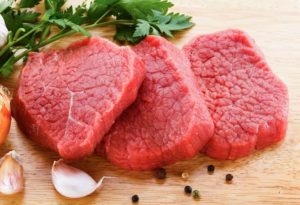Is that second serving of steak or extra strip of bacon worth shaving time off your life? Did ou know that Eating More Red Meat Can Shorten Your Life Span?
That’s a question researchers want you to ponder, because their new study finds the more red and processed meat you eat, the greater the odds of cutting your life short.
Lower risk of mortality
People who increased their red meat intake by just half a serving a day boosted their risk of dying over the next eight years by 10%, the study authors said.
And the type of meat made a difference, the investigators found. Eating a half serving more of processed meats like hot dogs and salami was tied to a 13% higher risk of dying early, while more unprocessed meat increased the risk 9%.
Research shows that when people reduce their consumption of red meat and add other sources of protein, they have a lower risk of mortality.
The good news: Cutting down on red meat and adding vegetables, eggs, dairy, seeds, whole grains, nuts, fish and chicken to your diet will add years to your life, said Dr Frank Hu,the chair of the nutrition department at the Harvard T.H. Chan School of Public Health in Boston.
The study found that replacing one serving of red meat with fish every day over eight years was tied to a 17% lower risk of death over the next eight years.
Lower meat consumption
“We also know that red meat production has a significant environmental impact,” Hu said. “To improve both human health and the environment, it’s important to adopt a healthy diet that emphasises less meat consumption.”
For the study, Hu and his colleagues collected data on nearly 54 000 women who took part in the Nurses’ Health Study and almost 28 000 men in the Health Professionals Follow-up Study, starting in 1986.
The researchers looked at meat intake over eight years and the risk of dying in the following eight years.
Eating more red meat was tied to a higher risk of death from cardiovascular disease, respiratory disease and neurodegenerative disease, the findings showed.
The risk remained for all participants regardless of age, physical activity, dietary quality, smoking or alcohol.
Evidence has shown that consuming red and processed meat increases the risk for type 2 diabetes, cardiovascular disease and certain cancers, Hu said.
A more plant-based diet
The life-shortening effect of red meat may be due to increased cholesterol, iron, preservatives and cancer-causing compounds that are produced when meat is cooked at high temperatures, he noted.
In addition, red meat has been tied to certain bacteria in the gut that might increase the odds for atherosclerosis, Hu said.
Despite the evidence, some people still cling to the idea that humans are meant to eat meat, said Samantha Heller, a senior clinical nutritionist at NYU Langone Medical Center, in New York City.
“Dismayed meat eaters say that humans are born carnivores and that meat is the only good source of protein, neither of which is necessarily true,” Heller noted.
The human body is not designed to withstand the large portions and long-term consumption of meat seen in developed countries, she explained. It doesn’t matter if the animal is grass-fed or the meat is organic.
“One can easily meet their protein needs with a more plant-based diet, consuming foods such as nuts, legumes, grains, vegetables and seeds,” she suggested.
Confounding factors
“Eating more plant foods and fewer foods from animals helps to reduce the risk of many chronic diseases and mortality,” Heller said.
A spokesperson for the beef industry disagreed with that assessment.
“Beef provides high-quality protein and nutrients essential to growth and strength from infancy through our later years,” said Shalene McNeill, executive director of human nutrition research of the National Cattlemen’s Beef Association.
McNeill said the study had limitations. It looked at the diets of health professionals from more than 20 years ago, “who were eating nearly twice the amount of red meat eaten on average today,” she noted.
Additionally, study participants whose red meat intake was unstable also had lower levels of physical activity and were more likely to smoke.
These confounding factors make it impossible to show cause and effect when it comes to eating red meat and health outcomes.
Source:Health24

